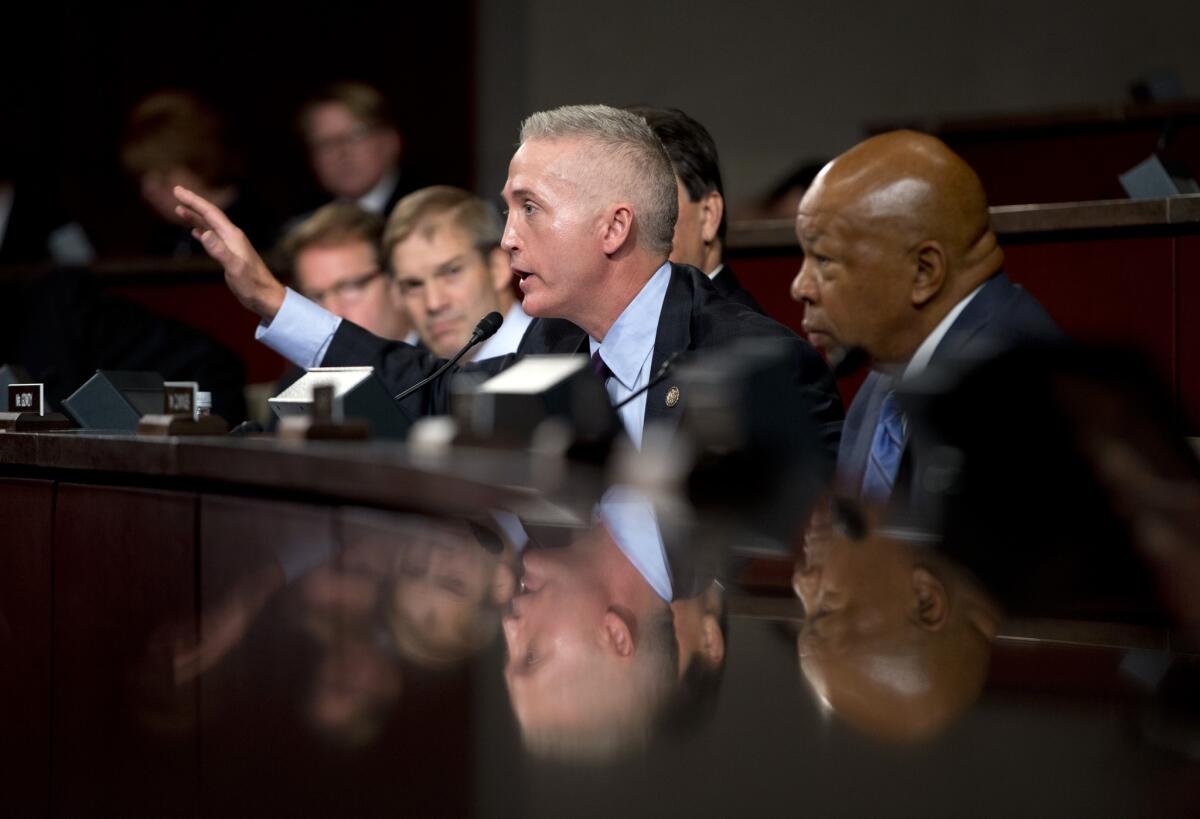House panel’s Benghazi surprise: little partisan rancor

House Select Committee on Benghazi chairman Rep. Trey Gowdy (R-S.C.), second from right, joined by ranking member Elijah Cummings (D-Md.), right, gestures as he speaks on Capitol Hill in Washington on Wednesday.
- Share via
Reporting from Washington — After two years of political warfare that turned even the word “Benghazi” into a partisan epithet, a special House committee held its first public hearing Wednesday with a surprise – a deliberate effort at being sober, even boring.
Rather than photographs of burning buildings and rampaging mobs in Libya, the hearing of the Select Committee on Benghazi featured organization charts. And rather than revisiting the events that led to the deaths of Ambassador J. Christopher Stevens and three other Americans on Sept. 11, 2012, the questions mostly focused on a less discussed issue – whether the State Department has improved security procedures since.
The shift reflected an effort by the House Republican leadership to lower the temperature, at least for now. Some Republican officials say that hearings led this year by the often-inflammatory Rep. Darrell Issa (R-Vista) had backfired by making the party’s pursuit of what happened in Benghazi appear overly partisan.
The committee’s chairman, Rep. Trey Gowdy (R-S.C.), set the wished-for tone with his opening statement: “I remain hopeful that there are some things left in our country that can rise above politics,” he said.
After previous attacks on U.S. embassies in Lebanon in 1983 and in Kenya and Tanzania in 1998, security experts made recommendations on how to prevent future attacks, Gowdy noted, but some of those suggestions were never put into action.
“We do not suffer from a lack of recommendations. We do suffer from a lack of implementing and enacting those recommendations, and that has to end,” he said, by implication questioning the State Department’s management under both Republican and Democratic administrations.
Of course, partisanship is never far from the surface on Benghazi. Because the deaths of the four Americans happened during Hillary Rodham Clinton’s tenure as secretary of State, Republicans repeatedly have used the events to challenge her ability as a leader. Democrats have shaped their response around a desire to protect their likely presidential candidate.
Gowdy focused on Clinton later in the hearing without mentioning her name, questioning the State Department’s current head of security, Assistant Secretary Gregory B. Starr, about recommendations that a review board made after the 1998 bombings. One of those called for the secretary of State to “personally” review security of U.S. posts. In the months before the Benghazi attack, Stevens and other diplomats in Libya had asked for additional security, but a subsequent review board found that mid-level officials had not responded and had not brought the issue to Clinton’s attention.
Democrats, led by Rep. Elijah E. Cummings of Maryland, denounced “Monday morning quarterbacking.”
But in contrast with Issa’s hearings, which sometimes devolved into shouting matches, Wednesday’s three-hour proceedings were sedate.
Much time went to discussing whether State’s top security officer should be an assistant secretary or a higher-ranking undersecretary. An advisory panel on security practices, two members of which also testified on Wednesday, had recommended the position be upgraded.
Starr, who took the job more than a year after the Benghazi attack, assured the committee members that he had the authority to enforce security procedures. And he described several steps that State has taken in the last year to tighten those up:
The department added 17 new Marine security guard detachments at overseas posts. It identified its 30 highest-risk posts and evaluated their security needs. “Tripwire” events – specific indications of a threat – now get reviewed in Washington as well as in the field. And officials have worked with the Pentagon to expand the military’s ability to respond to emergencies at embassies.
But “there has to be realization that we don’t have bases everywhere in the world,” Starr warned. “Physical distances, just the amount of distance between where our military is stationed and where our diplomatic facilities are, make it impossible” for the military always to respond quickly.
Moreover, “this idea that, you know, we’re magically going to get paratroopers coming out of the back of planes, and they’re going to land on the American Embassy, isn’t realistic,” he said. In dealing with countries with which the U.S. isn’t at war, “we still have to go through airports. We have to get permission from host countries to get personnel in. We have to transport them from the airport to the embassy somehow.
“In the midst of a crisis, this isn’t really realistic.”
At least one member of the committee questioned whether security concerns have gone too far.
Foreign service officers “have described to me what they consider the ‘Benghazi effect’ on their jobs, and by that they refer to such a heightened concern about security that many of them feel they cannot fulfill their mission anymore,” said Rep. Adam B. Schiff (D-Burbank). “We want to protect our people as best we can, but we want them to be effective. That’s why they’re there.”
“We can’t lock people inside embassies,” Starr agreed. “In the immediate aftermath after Benghazi,” he said, “the pendulum may have swung the other way for a while.” Now, however, “we are still, even in the highest-threat locations, getting them to the meetings that they need to get to.”
Follow @DavidLauter on Twitter for news from the nation’s capital
More to Read
Sign up for Essential California
The most important California stories and recommendations in your inbox every morning.
You may occasionally receive promotional content from the Los Angeles Times.











